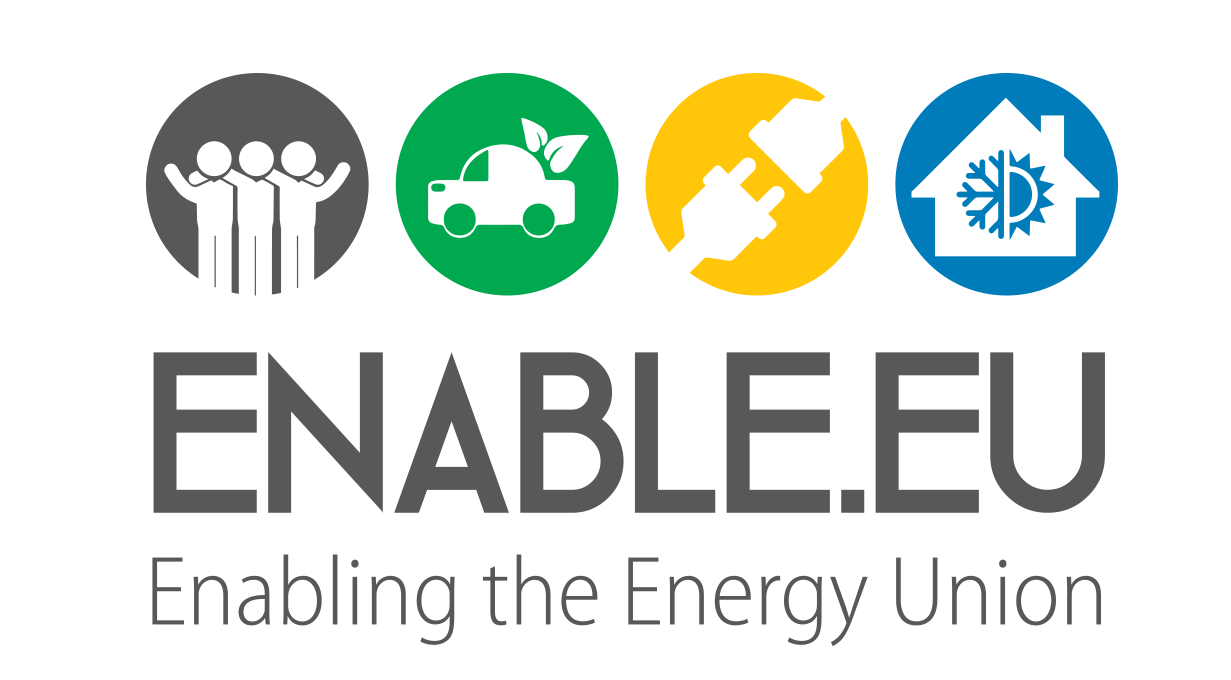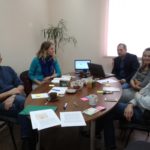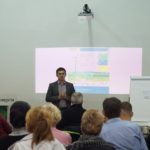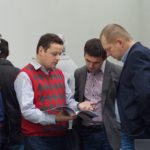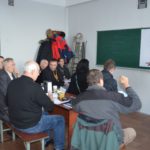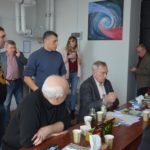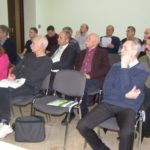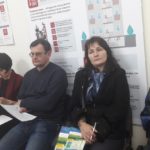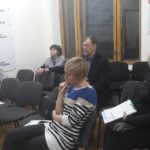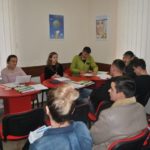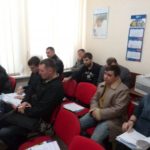In October-December 2017, the Centre for Global Studies Strategy XXI conducted several events based on the heating and cooling case study in Kiev and other regions within the Ukraine, to better understand the main differences in consumer approaches to energy consumption and strategies to lower bills.
The pilot focus group
On October 13, 2017, CGSS21 organized the pilot focus group for the heating and cooling case study. The event took place in Kiev and included six participants. Prior to the meeting, an online questionnaire was launched among participants, based on the household survey. Collected results have been used for further discussion and analysis of heating bills.
The goal of the focus group discussions is to formulate policy recommendations that could shift behaviour towards more sustainable consumption. These discussions led to the following recommendations:
- Support the spread of autonomous heating systems, as people consider it a way to reduce heating bills, given the lower energy prices for private consumers and the opportunity to regulate their own consumption through valves and automatic temperature controllers.
- Awareness of energy efficient behaviour is connected to consumer behaviour and social environment. In Ukraine, prices have been subsidised for the main energy sources, including heating and electricity, for a long time. This has led to consumers ignoring their levels of consumption.
- The wish to economise/save money and general economic factors are among the reasons mentioned most often for paying more attention to heating and electricity bills.
- Investment opportunities are important issues for private house owners and consumers who live in houses with automatic regulation of heating and individual metering devises.
- Electricity bills related to cooling are not important issues for consumers in Ukraine, because cooling is not often used. The amount of the bill related to cooling, however, is significant – about 40% of the electricity bill.
Ivano-Frankivsk
On November 4, 2017, the CGSS21 conducted a focus group in Ivano-Frankivsk with 16 owners of apartments in condominiums and private households. The focus group led to the following policy recommendations:
- Thanks to its geographical closeness to Central European countries, where EE technologies are more developed than in Ukraine, as well as the “New Energy” campus of the Ivano-Frankivsk National Technical University of Oil and Gas, the city of Ivano-Frankivsk is the most advanced city of those visited by CGSS21 in terms of energy efficiency measures and there is a high level of awareness of new eco-friendly technologies among locals.
- Automation of apartment heating. The organizations of co-owners of apartment houses (OSBBs) are very active in implementing energy saving technologies, particularly solar panels on the roofs of apartment houses and independent individual heating systems.
- Automation of apartment metering. There is a strong tendency to set up the district heating substations.
- A high level of involvement of international funds, grant programs and local authorities, in combination with availability of information at the local level make Ivano-Frankivsk a success story for other cities to emulate.
Kiev
On November 15, 2017, the CGSS21 conducted a focus group meeting in Kiev in the Energy Center of the Kiev National University of Construction and Architecture with 11 representatives of apartment houses in one of capital’s districts.
The discussion led to the following policy recommendations:
- Kiev has many old apartment houses with old technical solutions, for example, vertical heating systems, which present serious obstacles to energy efficiency steps such as personal metering.
- A low level of organization between the co-owners of the apartment houses makes it impossible to implement individual distribution substations in buildings, as well as metering tools to control the quality of heating at the entrance point. Quite often people do not know how to organize OSBB due to insufficient government efforts to explain these processes.
- Air recuperation is considered an effective measure to improve energy efficiency.
- The wish to save money and general economic factors are among the reasons mentioned most often for paying more attention to heating and electricity bills.
Lviv
On November 29, 2017, the CGSS21 organized a focus group meeting with 20 participants for the heating and cooling case study in Lviv. During the meeting, a questionnaire based on the household survey was conducted, to be used for further analysis. The goal of the Lviv Focus Group discussions was to see what factors impact heating bills, to learn more about challenges and find strategies to achieve more sustainable and eco-friendly H&C behaviour.
The following policy recommendations arose from the discussion:
- Supporting heating autonomy involves both autonomy of heating and autonomy of metering/regulating. Autonomy of heating provides consumers with independence but depends on laws and regulations, as well as technical and security possibilities. Meanwhile, households can be autonomous thanks to individual metering and regulating tools along with energy saving measures.
- Awareness of energy efficient behaviour is connected to consumer behaviour and depends on the availability of information. Governmental and local information campaigns, entertainment, education (information) centres, examples and success stories can go a long way towards achieving better availability of information. Consumers also receive information from abroad on new technologies.
- The Lviv focus group showed that energy efficiency initiatives depend a lot on trends. Energy efficiency and saving measures are implemented more easily in the electricity sector. This is not a primary energy resource, like gas or coal, but provides flexibility as it can be produced from different energy resources (gas, coal, water, solar, nuclear and other resources) and can be regulated. For this reason, electricity is becoming more and more popular in heating and cooling.
- Consumers need to be encouraged by governmental regulations and norms as otherwise they are not interested in making changes because of subsidies and privileges. So, the opinion of the focus group was to change the state policy of supporting socially vulnerable consumers to a money-based one.
- Investment is very important for consumers in Lviv and the other cities and towns of Ukraine. They should have clear and straightforward conditions, be reliable and be supported by the government and local authorities. Consumers are ready to use investments, but they need additional information on conditions and consequences, and potential investors should be interested in investing in the heating and cooling sector.
Dnipro
On December 12, 2017, the CGSS21 organized a focus group on heating and cooling in Dnipro with 19 participants, including homeowners and owners of flats in apartment houses of different age and income levels. Prior to the meeting, an online questionnaire based on the household survey on heating and cooling was conducted. Collected results were used for moderating a discussion and further analysis. The goal of the Dnipro focus group was to study challenges that impact heating bills and finding strategies to encourage more sustainable and eco-friendly H&C behaviour.
The discussions in Dnipro led to the following policy recommendations:
- Energy audits are perceived by Dnipro residents as an effective precondition for modernising the old apartment houses in line with energy efficiency requirements. They have a clear understanding of the services provided by the local energy audit firms, but there is a lack of financial resources for the modernisation of the buildings after these audits.
- Dnipro could be named a city leader for the process of establishing organisations of co-owners of apartment houses (OSBB), which could encourage the modernising of buildings to be more energy efficient. The seminars on the effective management of apartment houses are held in the city on a regular basis. The locals are interested in energy efficient technologies and have requested more local educational programs where they could get information on state loans and ways to modernise their houses.
- The poor quality of the heating supply services provided though district heating systems induces Dnipro residents to use electric heating devices as additional heating sources in apartments. But moving from a centralized to an individual heating system is hampered by local authorities, who insist that such a switch would destroy the apartment houses and therefore do not issue permissions.
- In general, the citizens of Dnipro have a good awareness of the “warm loans” and other state support programmes to modernize their apartment houses. The main barrier is the limited availability of state loans, as the number of people who wanted to take advantage of these programmes exceeds the programme’s limits.
Pereyaslav
On December 20, 2017 the CGSS21 conducted a focus group meeting on heating and cooling in Pereyaslav, one of the biggest district capitals in the Kiev region. The core topic for the meeting was heating bills, with a later discussion about the importance of air conditioning and necessary measures for reducing consumer bills.
Attention was given to common and individual obstacles to reducing energy consumption. The focus group looked at factors that might impact the amount on heating bills. On that basis, the participants identified the main challenges to the shift towards more sustainable and eco-friendly H&C behaviour, and found strategies to face those challenges.
The discussion led to the following policy recommendations:
- Supporting individual control of energy use incentivises the reduction of energy consumption. Households can be made autonomous thanks to individual metering and regulating tools in combination with energy saving measures. The implementation of the “Kiev region energy efficient” state programme aimed at individual metering of energy in state institutions such as schools has helped locals to move in this direction. The pilot project to run an individual distribution substation in one of the schools in Pereyaslav is underway.
- The Pereyaslav focus group showed the strong commitment of local authorities to energy efficiency initiatives. The town joined the Covenant of Mayors – a European co-operation initiative involving local and regional authorities – to increase European investment in the towns, which have less than 50 000 inhabitants. In line with this, a Sustainable Energy Action Plan for Pereyaslav is being developed.
- Locals understand energy audit firms and use their services to modernise their households, but a lack of affordable investment sources and the inaccessibility of state support programmes such as “warm loans” complicate this process.
- Increases in energy prices stimulate locals to find new ways to save money by using heat-saving and air recuperation technologies.
Rivne
On December 23, 2017, CGSS21 organized a focus group on heating and cooling in Rivne with 12 participants. Prior to the meeting, an online questionnaire based on the household survey was conducted, the results of which were used to moderate the discussion and analyse its results. The goal of the Rivne focus group discussions was to study challenges and factors that impact heating bills and to find strategies to promote more sustainable and eco-friendly H&C behaviour.
The discussion in Rivne led to the following policy recommendations:
- Unclear heating bills are a primary obstacle for the eco-friendly H&C behaviour of consumers in Rivne as they are unable to understand how tariffs are calculated and how to reduce their heating bills.
- The centralised Rivne heating system hampers the autonomy of heating and metering/regulating. Moreover, this system is old and in bad shape, which increases the unjustified burden on consumers.
- The poor quality of heating provided by the monopoly in Rivne is unrelated to the amounts in heating bills, motivating local consumers to have better control over the services provided and the monopoly’s activities.
- Trends in Rivne. The poor quality of heating pushes consumers towards autonomy by moving from buildings with multiple apartments to private houses or by using electric heating devices as additional heating sources in their apartments.
- Awareness of energy efficient behaviour depends on the availability of information. Consumers need more information on new energy efficiency and energy saving technologies, possible solutions, local and governmental programmes, bank loans and success stories of other consumers in the city. Successful examples could be presented through the creation of local education and consumer support centres.
Conclusion
This series of focus groups conducted by the Centre for Global Studies Strategy XXI on heating and cooling identified the general factors that influence consumer behaviour in Ukraine and outlined some policy recommendations. Given that there is a similar level of availability of sustainable energy technologies throughout the region, almost all focus groups have the same policy issues, such as a lack of investment and inaccessibility to public loans. This means that strategies and views regarding what impacts bills coincide from region to region. With the recent energy reform in Ukraine, followed by the jump in prices for energy resources, heating and electricity, the need to save money is motivating Ukrainians to implement energy efficiency projects that can lower their energy bills while keeping their homes comfortable.
